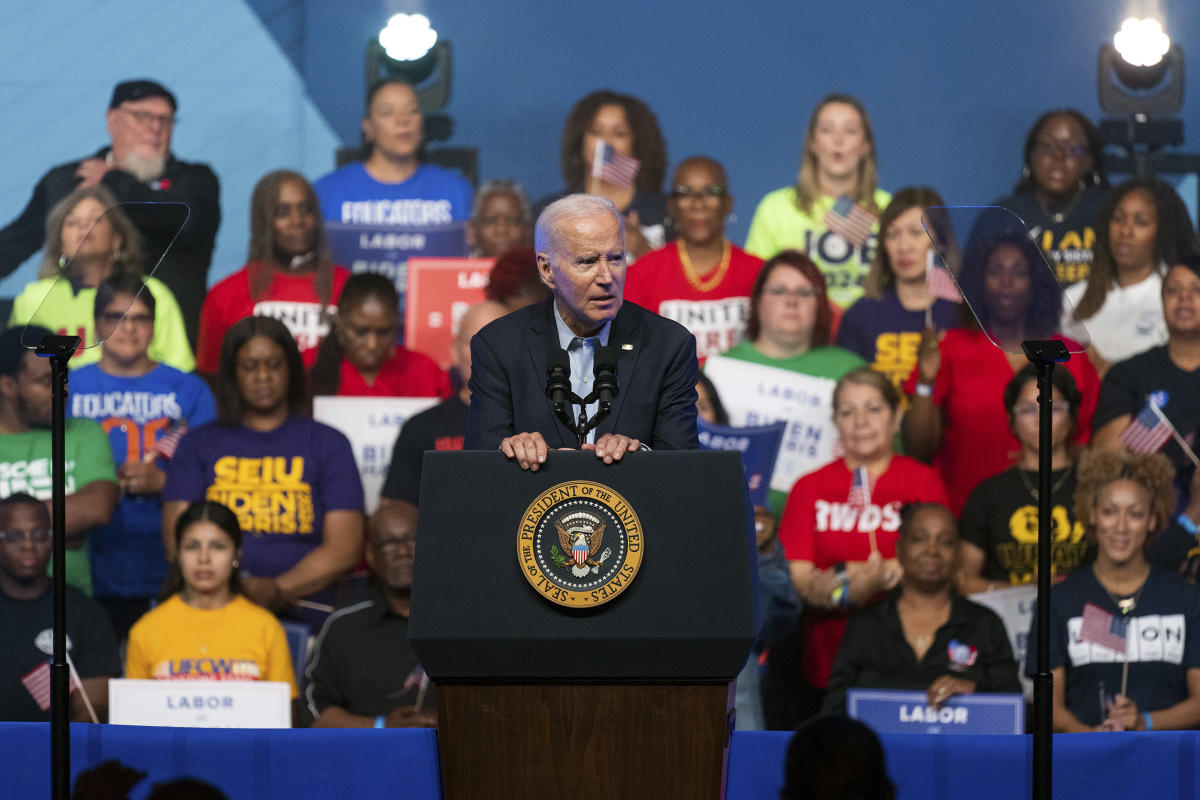Two months after President Biden announced plans to seek reelection, his campaign operation is still very much a work in progress. No campaign headquarters has opened its doors. Only a handful of key staff are on the job. And the candidate has been — and plans to continue largely focusing on his day job.
For now, Biden’s team is relying on more than a little help from its friends to tide them over.
On Saturday in Philadelphia, the city where his 2020 campaign was based, it was instead the nation’s largest labor unions putting on his first public political event of his 2024 campaign. They did so one day after an unprecedentedly early and coordinated series of announcements from a half-dozen unions that aren’t always on the same page.
“But if there’s anything that unifies, it’s a pro-union president,” AFL-CIO president Liz Shuler told NBC News.
She and other leaders of major unions represented here Saturday said their coordinated efforts were about sending a message to their members and to the country about both what they say is the president’s sterling record on labor issues and the economy, but also the high stakes of the 2024 vote.
“When you have nurses, janitors, construction trades, and teachers all getting together in three weeks to say we’re going to do this, that is a message to workers all over the country that this man cares, he cares about you and he cares about us as working people,” said Randi Weingarten, president of the American Federation of Teachers.
And it’s not just unions. Earlier in the week, major environmental and climate-focused political organizations similarly announced their 2024 endorsements together. And next week, ahead of the first anniversary of the Supreme Court striking down constitutional protections for abortion, major women’s groups are expected to make a similar unified show of support for the Biden-Harris ticket.
Biden advisers have worked for months to line up these coordinated announcements with two goals in mind — showing that the party is solidly behind the 80-year-old incumbent, and showing there will be significant reinforcements in the effort to rally key voting constituencies — union workers, young voters, and women.
One adviser acknowledged the campaign “is still building up,” but said there is “no reason for us to have a full-fledged campaign” this early.
“One of the important things about these early endorsements really is that these are membership organizations. The early communication, the early engagement with their members around the president’s record … is critically important to what comes ahead,” the adviser said. “So we view this as a hugely consequential week.”
The Biden team expects to move from Washington, where a small staff has been working out of the Democratic National Committee headquarters, to a Delaware-based headquarters this summer, the adviser said.
A former Obama 2012 campaign official, now working with an outside group supporting Biden, said the Biden campaign is behind Obama’s pace in terms of staff and operations built out. But the official also noted that in 2012, other party infrastructure was far weaker.
Obama’s 2008 campaign operation was not folded into the DNC, but stood up as a distinct political entity, known as Organizing for America. Democrats also held fewer governorships after the 2010 midterm elections than the party does now after 2022, which the adviser said translates to stronger state party operations that will support Biden, especially in key states like Pennsylvania, Michigan, Arizona and Wisconsin which had Republican governors in 2012, but Democrats in place now.
With the Biden campaign’s voter organizing and turnout efforts not yet in place, unions are already at work — and much earlier than in the past.
“We had a real political machine that would show up three months before an election. … But now we’re backing that up,” the AFL-CIO’s Shuler said. “We want to actually approach this from an issues-based lens, talking about, ‘OK, what’s important to you?’ listening to the concerns of working people, and actually engaging in conversation because we know face-to-face interaction is the only thing that breaks through a lot of that misinformation that’s out there.”
“There were 18 million people represented in this room. Their families, friends and neighbors take us well into the 30 millions. That is the infrastructure that we are going to educate and excite and then turn out voters all through ’23 and ’24,” Mary Kay Henry, president of the SEIU, said. “It’s not on the president by himself. We have to be part of the solution and talk to members, working people and our families about what’s at stake.”
Henry noted that Biden’s campaign manager, Julie Chavez Rodriguez, has deep roots in the labor movement and “understands that we’ve got to build a powerful organization that educates people, persuades them why it matters to get out, and then turns them out.”
Rep. Brendan Boyle, D-Pa., a member of Biden’s team of surrogates known as the advisory council, said presidential campaigns “now last about half of the length of a presidential term,” and Biden is right to keep most of his focus on his official duties.
“For those of us who are strong supporters of the president who are part of the team, it is important that we are communicating that message back home, especially in the biggest battleground state in the nation,” he said.
This article was originally published on NBCNews.com







